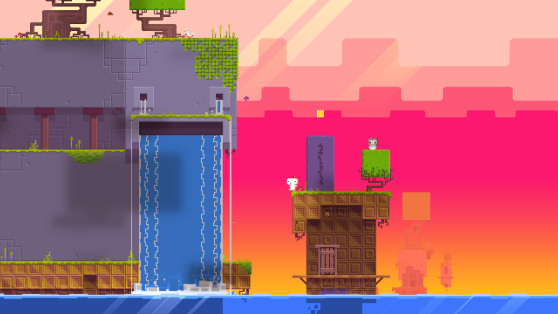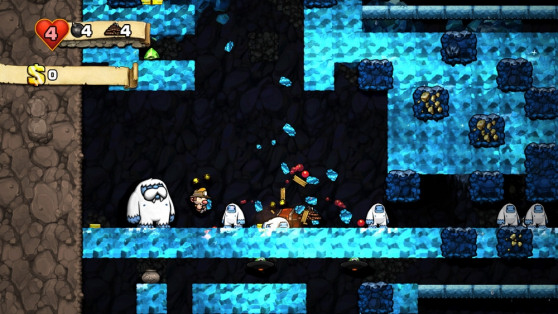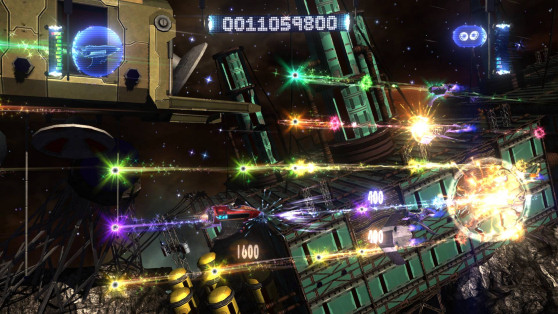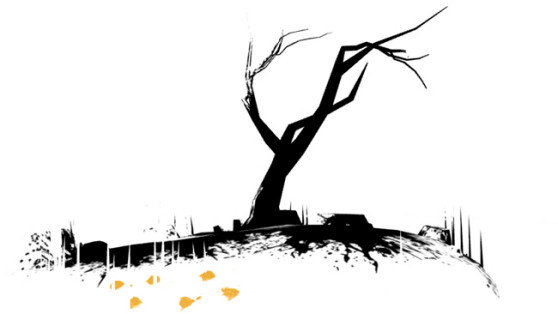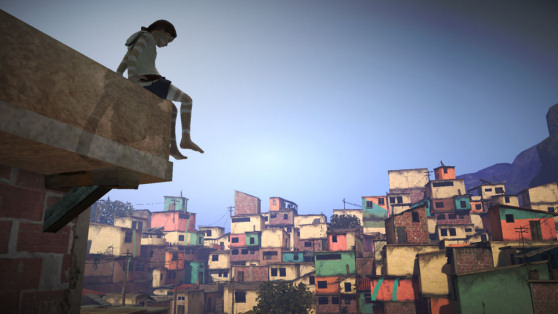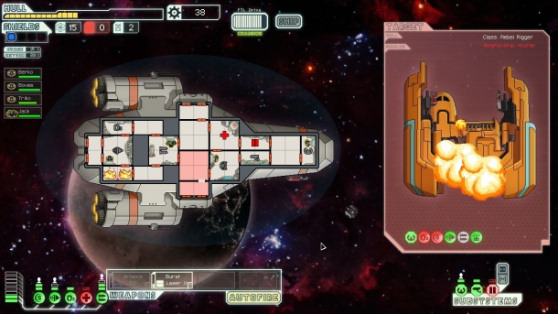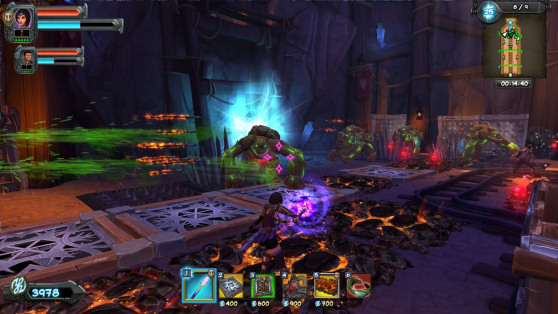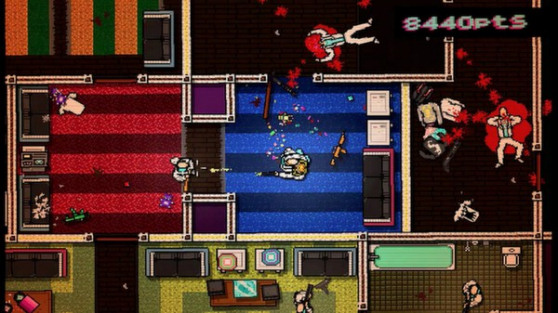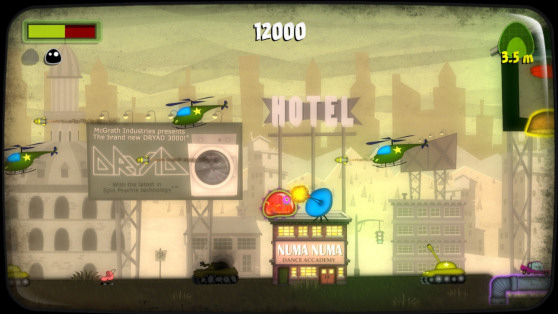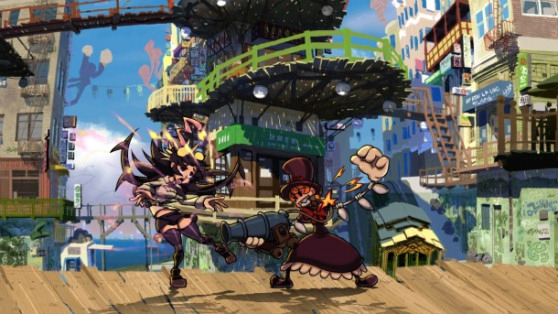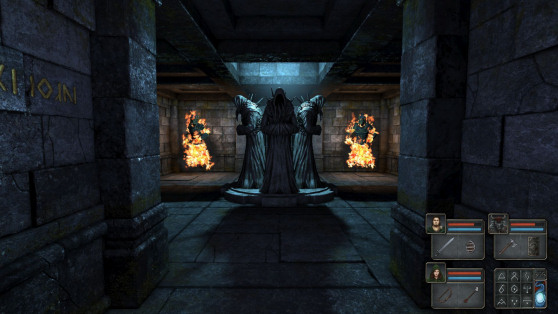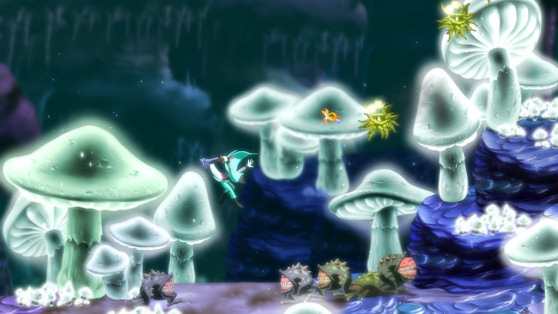Indie games are more than inexpensive alternatives to this year’s Assassin’s Creed and Halo; they’re mouthpieces for serious issues, bold experiments in game design, and canvases for discovering new artistic possibilities.
We sorted through 2012’s releases and chose the 15 strongest and most influential titles, in no particular order. Feel free to let us know which ones we missed in the comments. Or tell us we’re completely nuts. Whatever makes you as happy as these games made us.
Fez
Developer: Polytron Corporation
Publisher: Microsoft Studios
Platform: Xbox Live Arcade
Release Date: April 13, 2012
We might as well get the elephant out of the room first: Fez is a smart and challenging puzzle-platformer with bad associations. Creator Phil Fish lashed out against gamers and Japanese developers in the spring, and he won few people over with his personality. Luckily, Fez’s charming style and engaging gameplay are as memorable as his antics, only better.
Fez puts a tiny, two-dimensional hero named Gomez in a world that you can rotate and explore three-dimensionally. The complexity of the space Gomez inhabits is what leads to the game’s many brainteasers, but the peaceful visuals and soundtrack encourage impatient players to slow down and reflect.
Although widely praised, Fez is the center of a big controversy — and host to criticism — because of the game’s glitches and the perhaps inadequate steps that Polytron and Microsoft took to fix them. Should we hold developers and publishers responsible when they fail to issue patches that improve the experience for everyone? Do we have the right to boast that Western games and development are superior to that of another country, especially one that’s contributed so much to the medium? Polytron delivered one of the best indie games of the year, but it also gave the industry something much more valuable: an attitude adjustment. Whether that’s made us better or worse is hard to say. The Japanese, at least, have made the most of the criticism — warranted or not.
Spelunky
Developer: Mossmouth
Publisher: Microsoft Studios
Platforms: PC, Xbox 360
Release Date: July 4, 2012
Before you yell that Spelunky is from 2009, take a look at the screenshot above. Or better yet, fire up your Xbox 360 and behold the differences. Spelunky on Xbox Live Arcade is a completely new model, not only graphically improved compared to its PC counterpart but also with more content. The action-platformer now has 1-to-4 player co-op and deathmatch, new music and zones, and additional enemies and traps.
The appeal remains the same: Explore and survive. Sometimes making it to the next area requires a careful balance of risk and reward, such as a decision to attack the shopkeeper and incite violence or leave the princess safely behind, for example. Sometimes it comes down to plain luck. And part of it depends on whether your friends are reliable or whether they’re all too happy to let you suffer.
Spelunky’s recipe is one of the most irresistible in game design. The promise of randomized adventure and secrets keeps players from setting down their controllers even though they’ve died countless times (and will many more). It’s a game that you’ll love to hate and an excellent case study of how to serve both PC and console crowds without losing what makes the experience exciting and original.

The Walking Dead: Episodes 1-5
Developer: Telltale Games
Publisher: Telltale Games
Platforms: PC, Mac, PlayStation 3, Xbox 360, iOS
Release Dates: April 24, 2012 through November 21, 2012
With how big Robert Kirkman’s zombie series The Walking Dead has become — leaping from comics, where it all started, to television and now video games — it’s easy to forget that so much of its success is in the hands of independent creators and developers.
Telltale Games has stirred the emotions of players for nearly a year, fascinating them with a surprisingly well-handled story and, better yet, bringing attention back to the point-and-click adventure genre. All five episodes have set a new standard for interactive storytelling. And the game could give the TV show a few pointers about how to create compelling character performances.
The Walking Dead is also a huge success for a relatively small independent company with a modest portfolio of games, including Sam & Max and Wallace & Gromit. Not all of them have been winners, like Jurassic Park: The Game. But this breakaway hit foretells good tidings for Telltale in the new year.
Retro/Grade
Developer: 24 Caret Games
Publisher: 24 Caret Games
Platform: PlayStation 3
Release Date: August 21, 2012
You could learn a lot from your mistakes if only you could rewind time.
That’s the challenge of rhythm-space game Retro/Grade, where you control a spaceship pilot bobbing his head to the music as you play events in reverse. You’ll need to pay attention to the beat as much as the colorful lasers streaking across your screen, which you “collect” so that when the action moves in real time again, you can dominate the battle. Each burst of energy within these lanes of light is your own ship fire, so when you suck up one of these, you’re also shooting it against the enemy in the present flow of time. You can also fast-forward using your rocket’s fuel to give yourself extra seconds to fix your mistakes.
It’s a clever side-scroller and twist on the shooter and music genres, and equally as engaging is Skyler McGlothlin’s (electronica music artist Nautilis) soundtrack and the zero-gravity, free-flying motions of the course you chart. Just keep an eye on the background as you spin and rotate your way through the awesome regions of space. It’s pretty cool.
The Unfinished Swan
Developer: Giant Sparrow
Publisher: Sony Computer Entertainment
Platform: PlayStation 3
Release Date: October 23, 2012
The Unfinished Swan is an abstract tale of loss and our need for closure. You play as Monroe, an orphan boy whose mother dies and leaves him one of her paintings, an illustration of a swan. When the bird escapes its picture, Monroe follows its orange footsteps through a world that you create one glob of paint at a time.
It’s a perpetual visual wonder, but as you progress, the game evolves and redefines the way you interact with it. What begins as paint becomes water, and so on. Discovering the unknown is the source of real magic here, not merely the acts themselves, and the things you find inspire your imagination as though you had stepped into a fairytale.
The Unfinished Swan’s fragmented images and themes might feel incomplete to some — almost like you’re touring Monroe’s mother’s unfinished paintings come to life. But as a whole, it’s one of the most original and artistic games of the year.
Click through for our next five picks.
Mark of the Ninja
Developer: Klei Entertainment
Publisher: Microsoft Studios
Platforms: Xbox 360, PC
Release Dates: September 7, 2012 (Xbox 360) and October 16, 2012 (PC)
Stealth is a difficult element to get right, and maybe that’s because developers frequently sprinkle it into games where it doesn’t belong. Mark of the Ninja finds the solution to this problem, marrying stealth with gameplay mechanics that complement each other rather than work in opposition.
Like with any good game in the genre, you can approach a situation any number of ways. The environments, obstacles, and resources at your disposal fit together like a puzzle, laying out the information and tools you need to execute a successful assassination, create a necessary diversion, or vanish into the shadows. The system is meant to be flexible. It’s almost like the developers were cunning ninjas themselves.
The sights and sounds around you — beams of light or echoes of footsteps approaching, for example — are vital clues of how you can move invisibly through your surroundings uncaught. But the stylish visuals and polished gameplay will lure you in like a carefully placed trap.
Journey
Developer: Thatgamecompany
Publisher: Sony Computer Entertainment
Platform: PlayStation 3
Release Date: March 13, 2012
This no-dialogue exploration game was one of the earliest hits of 2012. People knew the next title from the creator of Flow and Flower was going to be good, but few were prepared for the emotional impact it would have on them.
Journey communicates with its players — and in turn, they connect with others — through breathtaking visuals and pleasant sounds. You can take your time, soaking in the atmosphere and sights of the game, and you can travel either alone or in someone else’s company. The way you choose to play Journey represents only one type of possible experience, and you may learn something new on your second or third time around. But each trek through the desert and up the great mountain is ultimately the same, and that realization evokes a strong sense of destiny.
For that reason, the game is partially about faith — the hope that one day, your fate will change because of your actions and perseverance. Journey also teaches us to interact with other human beings without words, using only gestures and behavior as the game removes the normal obstacles of language and culture. In Journey, your goal is shared, and unlike many games, the meaning of your adventure changes dramatically when you have a companion.
Papo & Yo
Developer: Minority Media
Publisher: Sony Computer Entertainment
Platform: PlayStation 3
Release Date: August 14, 2012
Whereas The Unfinished Swan is a young boy’s reaction to a parent’s untimely death, Papo & Yo deals with child abuse and the power of escapism. This Sony Pub Fund game takes the terrors of a boy named Quico and manifests them in a fantasy world where he can face them on his terms.
It’s certainly not a game without its share of problems, namely glitches, but for putting players in the middle of such a dark story, Papo & Yo is full of playfulness and life. You can admire the colorful expressions of the graffiti decorating buildings that grow and sink as you manipulate the city landscape or it crumbles of its own accord. You can sling fat frogs against walls and save them from becoming the Monster’s lunch, a poisonous snack for the metaphoric embodiment of the boy’s father who turns into a violent beast when he consumes them.
The message Papo & Yo sends is a powerful one, and you’ll need to play the game to appreciate its nuances. But no matter how horrible Monster can be, Quico also sees the good side and takes care of the creature when he’s able. That unrequited kindness shows a maturity beyond his years, and it’s part of what makes the game so remarkable.
FTL: Faster Than Light
Developer: Subset Games
Publisher: Subset Games
Platforms: PC, Mac
Release Date: September 14, 2012
Space is a vast and dangerous place. FTL: Faster Than Light challenges you to survive in it. But staying alive in this space flight simulator game involves much more than maintaining a trajectory from one planet to the next.
The intensity and unpredictability of the gameplay is rewarding — and difficult. You jump from one spot in space to the next, and in every new area, you can choose how to react to a unique scenario. Maybe some stragglers have sent out a distress beacon, but they could be deceiving you, so they can ransack your ship. Will you save others, make a preemptive attack, strike a deal, or flee?
The options seem limitless, but most of that variety comes from the attention to detail. You must manage precious resources, divert power to where you need it most, oversee your crew, repair your ship during battle, and upgrade it wisely — all while eluding the Rebel fleet constantly closing in on your location.
The first time you play, you’ll probably be a little cocky about your abilities. You won’t last long. The allure of dominating galaxies, mastering offensive and defensive strategies, and outsmarting your enemies is what keeps you coming back for more.
Orcs Must Die! 2
Developer: Robot Entertainment
Publisher: Robot Entertainment
Platform: PC
Release Date: July 30, 2012
After releasing one of the best tower-defense games of 2011, developer Robot Entertainment returned with an even greater improvement on the formula.
Orcs Must Die! 2 lets you choose between two controllable characters: the antagonist from the previous game, the Sorceress, and the War Mage. The setup is addictive and simple enough to pick up and play. You place clever traps and use your own powers to destroy waves of enemy orcs before they escape through the mines. It’s quite the workout for your trigger finger and strategic mind (particularly on single-player), but Robot Entertainment has filled the game with plenty of fun gear, trinkets, weapons, and more so that you feel powerful and overwhelmed in equal turns.
The sequel supports co-op play in the campaign or Endless mode, so you”ll never run out of ugly hordes to kill. The banter between the two characters at the start of each level is entertaining and natural, lending even more personality to a game that’s already bursting with color and creativity.
Let’s move on to our final five.
Hotline Miami
Developer: Dennaton Games
Publisher: Devolver Digital
Platforms: PC
Release Date: October 23, 2012
This gritty, violent top-down action game sets you on a rampage in Miami’s underground.
Developers Jonatan Söderström and Dennis Wedin’s Hotline Miami has racked up dozens of overwhelmingly positive reviews and some achievements as well, including one of IndieCade’s Official Selections of 2012. In the game, an antihero dubbed “Jacket” starts receiving phone messages with sets of instructions, which regularly involve mass murder. It’s then that these perceived events become increasingly weird and distorted.
Like many titles on this list, Hotline Miami is short, but the gameplay and momentum are intense — a full-throttle, satisfying experience that delivers more for $10 than many big-budget games do for $60.
It’s also achingly difficult — harsh on the eyes with bright colors and chock-full of risky solutions, frantic pacing, and assorted avenues of play. This is how the world works inside the head of a killer.
Tales from Space: Mutant Blobs Attack
Developer: Drinkbox Studios
Publisher: Drinkbox Studios
Platforms: PlayStation Vita, PC
Release Dates: February 21, 2012 (PS Vita) and August 15, 2012 (PC)
The follow-up to last year’s Tales from Space: About a Blob modifies the series for the touch-screen and button-based PlayStation Vita.
You control a mutant Blob that can devour debris in its environment to advance through otherwise impassible routes. Essentially, Mutant Blobs Attack combines physics with puzzle-platforming for a fresh take on Katamari Damacy: The more you absorb, the bigger you get. Other abilities allow you to telekinetically move objects or attract and repel magnetic surfaces, and so on. It’s an adorable game that crams in a surprising amount of depth.
Much faster compared to its console-grounded predecessor, Mutant Blobs Attack is a great fit for the Vita and one of the strongest titles in a shaky lineup. But that shouldn’t discredit the might of this little game. It’s innovative in a way that it wasn’t before, and it uses the handheld’s strength to its advantage, which — as we’ve seen from some of the less creative applications of the Wii and 3DS’s designs, for example — isn’t always easy to do on a versatile device.
And just because those tilt and touch features aren’t available on the PC doesn’t mean it’s any less addictive or humorous on that platform.
Skullgirls
Developer: Reverge Labs
Publishers: Autumn Games and Konami
Platforms: PlayStation 3 and Xbox 360
Release Dates: April 10-11, 2012
In a genre inundated with Street Fighters and Soulcaliburs, it’s nice to see a new contender now and then, whether that’s Persona 4 Arena or, in this case, Skullgirls and its small team of developers.
The game packs a big wallop of a punch for filling its roster with so few characters, all of them girls with loads of style and substance. The glossy, sleek visuals — that quality of animation that you can only really appreciate up close — exude a “Dark Deco” (or Art Deco) style, and you can see the active influences of Guilty Gear, BlazBlue, and even Marvel vs. Capcom at work.
You can play different types of matches, pitting characters against each other in 3-on-3, 2-on-2, or 1-on-1 battles or however else you want to mix them together. The thematic flair to each character’s moves, including supers and assist attacks, makes this all-female rumble much more brutal than a hair-pulling cat fight, and it’s fast-paced and fun.
[Correction: GamesBeat incorrectly identified Reverge Labs and new studio Lab Zero Games as the same entity. We apologize for the error.]
Legend of Grimrock
Developer: Almost Human
Publisher: Almost Human
Platform: PC
Release Date: April 11, 2012
Gamemakers pour bits of themselves into their work, especially when only four people are on staff to develop and finance it. Considering the undertaking the team behind Legend of Grimrock faced, you can understand why four might seem like the right number for a party of adventurers, too.
The grid-based, point-and-click dungeon crawler prides itself on old-school role-playing game puzzles and a modernized approach to a classic gameplay formula. Movement relies on the familiar north, south, east, and west cardinal directions — you could even “pencil-and-paper” your way through the labyrinth if you turn the automapping off, which gives the game a nostalgic appeal. And the seemingly restrictive, three-class system of rogues, fighters, and mages expands into racial traits, elemental skills, and more. Its adhesion to older RPGs can make it tough for today’s players to master.
At its core is a valued sense of exploration and player discovery that’s missing from contemporary games that would rather walk you through with baby steps and overdone tutorials. In Legend of Grimrock, how you carve out your quest becomes your story. The telling is in the moment — the makeup of action and atmosphere at its root.
Dust: An Elysian Tail
Developer: Humble Hearts
Publisher: Microsoft Studios
Platform: Xbox 360
Release Date: August 15, 2012
Dean Dodrill spent over three years making this game, and the result is a beautifully animated hybrid of genres: a 2D conglomerate of melee action, Metroidvania-like exploration, and role-playing elements.
Dust: An Elysian Tail positions you in Falana, a world populated with anthropomorphic animals. You play as Dust, who struggles to remember his past as he ventures forward with his silly sidekick Fidget. Bosses take the form of brief encounters, the majority of which last under a minute. As you unlock new abilities, the game encourages you to revisit past locations all while keeping the exhaustion of backtracking to a minimum.
Everything about the game — its flashy combat, creative environments, and other striking animations — are a spectacle worthy of admiration, but most impressive of all is how well Dust: An Elysian Tail comes together even after years of development. Sometimes the more you wait, the bigger the mess you have to clean up, especially when you’re one man shooting for such an ambitious culmination of genres. Dodrill pulls it off.
VentureBeat's mission is to be a digital town square for technical decision-makers to gain knowledge about transformative enterprise technology and transact. Learn More
